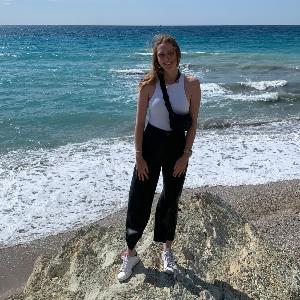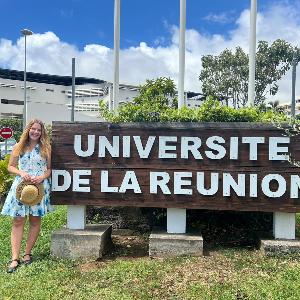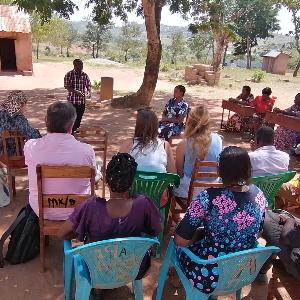Student teachers spread their wings
9 Jul 2024
LMU supports student teachers who are interested in studying abroad. These international experiences have many benefits.
9 Jul 2024
LMU supports student teachers who are interested in studying abroad. These international experiences have many benefits.

has gained experience abroad in Albania. | © privat
While working in Buçimas, on the shores of Lake Ohrid in Albania, Lea Meier always insisted on speaking German. She wanted to give her pupils as much exposure to her native tongue as possible. Where necessary, she communicated by means of mime, gestures, and pictures. “This experience was particularly valuable for me as a future elementary school teacher of German as a second language. Now I can communicate better with children in German classrooms who do not speak German yet – and see things from their perspective.”
Lea Meier is one of a growing number of student teachers at LMU who are spending an extended period abroad during their studies – for professional and personal development. Meier went to Albania on LMU’s “PrimA” program, run by the university’s Munich Center for Teacher Education (MZL). For this program, the internship office at MZL organizes and supervises the stays abroad of around 100 future educators every year. The school in Buçimas where Lea Meier studied and taught was one of the first PrimA cooperation schools when the program started some 15 years ago.
Teachers should also prepare for multicultural and often multilingual classes, in which a high percentage of the children come from migrant backgrounds.Karl Tschida , deputy director of (MZL
“We think it’s very important for future teachers to spend time abroad,” explains Karl Tschida, deputy director of MZL. “Being able to make their way in another language and culture is hugely helpful in their later career.” This is not only true for future language teachers, for whom a stay abroad is frequently mandatory in any case: “Other teachers should also prepare for multicultural and often multilingual classes, in which a high percentage of the children come from migrant backgrounds.”
Furthermore, the acquisition of intercultural skills is important not only for the development of students’ personality as a teacher, but also their personality as a whole. “And last but not least, the students get to know another school system and a different learning culture.”
There is still something pioneering about the student teachers who go abroad today. “Many of them – although not all of course – are deeply rooted in their hometowns, and some of them would like nothing more than to teach at the school they attended as children.” MZL promotes opportunities for going abroad at LMU’s International Day and at an annual information event specifically for student teachers: This includes foreign internships through the PrimA program, for example, or teaching assistant roles, or Erasmus scholarships, or studying opportunities outside of Europe with LMUexchange.
The latter is an exchange and scholarship program via which students can study at 150 non-European partner universities of LMU and are generally exempt from local tuition fees. In addition, student teachers can acquire teaching experience through special assistantship programs.

Yeshe on a trip to the Rocky Mountains | © private
When Yeshe Hoffmann looks back on his time in Canada on the LMUexchange program, the former student teacher of English and geography for academic high schools is effusive in his praise: “Fantastic, special, simply a wonderful adventure” is how he describes the two semesters he spent as a teaching assistant at the University of Alberta, where his German conversation courses supplemented regular language lessons. “My goal was to get students yakking with games, debates, and interviews.”
As an LMU student in an advanced semester, he was able to bring not only theoretical knowledge to the table, but also “a bit of teaching experience” as well. “I enjoyed the politeness of the Canadians and the wide open spaces. Also, I got to know myself better and made friends for life. Moreover, my experience abroad continues to resonate – even now during my official teacher training.”
When it comes to the preferences of student teachers, Karl Tschida from MZL explains, destinations like Canada and the United States are second only to popular European countries like England, France, and Spain. The European Union’s Erasmus scholarships, for example, are available for the latter countries. As an Erasmus+ scholar, you do not pay any student fees abroad, the credits you earn can be recognized, and you receive financial support.
Student teachers have very good chances here as a rule. You see, the Erasmus places are spread between the faculties at LMU. So an aspiring teacher of chemistry and English can apply to several offices at once.Claudia Wernthaler, Erasmus Outgoing team in the International Office at LMU
“Student teachers have very good chances here as a rule,” observes Claudia Wernthaler, who leads the Erasmus Outgoing team in the International Office at LMU. “You see, the Erasmus places are spread between the faculties at LMU. So an aspiring teacher of chemistry and English can apply to several offices at once.” Compared to students of other disciplines, however, student teachers still tend to be hesitant about going abroad. “We should recall that teachers convey an outlook on life to their students: How can I inspire them to be interested in European thought or another language without any personal experience abroad myself?”

LMU student Laura went to La Reunion, among other places, with Erasmus+. | © privat
This will most certainly not be a problem for Laura Großmann. The student teacher of English, French, and Italian has spent four semesters abroad. In addition to a self-organized stay in Ireland, she went to Lyon, Paris, and Réunion with Erasmus+. “Each place offered unique experiences with different customs and people.” But one thing was always similar: “After around two months of settling in, I started to feel at home.” Living in student dorms helped her make friends and culturally adapt.
In France, for example, she noticed that some aspects of everyday teaching were quite different to Germany – both at the university and at the practical courses in schools. “In Paris, say, the hierarchy between teachers and learners was much more pronounced than in Germany. This led to greater respect for teachers, but also to less openness on the part of schoolchildren in personal matters.”
Naturally, there were challenges too, says Laura Großmann. “As a rather shy person, I was often forced out of my comfort zone to follow up on administrative issues.” This helped her a lot in her personal development. “And in a literature course, the highly specialized French vocabulary of a novel set in the circus milieu initially drove me and the other Erasmus students to despair – and so our satisfaction was all the greater at the end when the tutors said our French had improved greatly.”
The International Office offers a range of services to students who have received a place at a partner university abroad – from support before, during, and after the stint abroad, to facilitating communication with students who have already done semesters abroad, to intercultural preparatory workshops. Moreover, students are able to acquire practical foreign language skills and intercultural experiences right here in Munich.
We initiated a dialog across borders which will benefit disadvantaged children.Dr. Luiz André dos Santos Gomes, Erasmus coordinator for pedagogy geared toward behavioral disorders and autism and encompassing inclusive education

LMU teacher training students discuss how to deal with children with behavioral problems with participants from the Open University Tanzania. | © privat
In this vein, MZL’s “LehramtPRO” certification program provides students with information about studying abroad and helps them learn intercultural skills. As an LMU Buddy or in the Munich Erasmus Student Association (MESA e.V.), student teachers can help foreign students settle into life in Munich and at the university. In addition, the SINIK Munich initiative offers intercultural sensitization training courses, while the “Europa macht Schule” program run by the German Academic Exchange Service (DAAD) enables students to collaborate with foreign counterparts to bring foreign worlds into German classrooms. Karl Tschida advises student teachers to take that extra step and go abroad themselves. Students concerned about how to fund their stay abroad will find support from LMU and from other quarters. For instance, a recent study trip to Tanzania for students learning to become special needs teachers was supported by the ProsaLMU foreign scholarship program, Erasmus+, and the German Academic Exchange Service.
In the cooperation program with the Open University of Tanzania, in which students from various types of schools and subjects at LMU took part, the focus was on dealing with schoolchildren who exhibit behavioral problems in class. “We initiated a dialog across borders which will benefit disadvantaged children,” recalls Dr. Luiz André dos Santos Gomes, Erasmus coordinator for pedagogy geared toward behavioral disorders and autism and encompassing inclusive education, who supervised the trip. In workshops on behavioral disorders, autism, and inclusion, these topics were discussed in depth, which was very enriching for everyone involved.
“In very productive exchanges, we discussed matters such as the challenges facing Tanzanian teachers when it comes to implementing inclusive principles in classes of a hundred pupils and more,” says Gomes. And the intercultural exchange is set to continue with the Erasmus+ project, which is offering the Tanzanian students the opportunity to study abroad – in October and November of this year in Germany, at LMU.